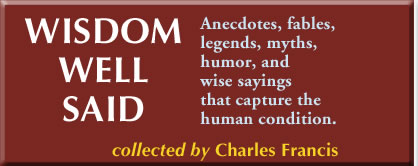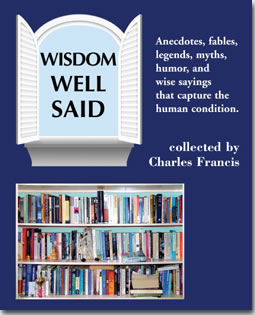 |
 |
 |
|||||||
 |
 |
 |
 |
||||||
 |
|||||||||
 |
|||||||||
| Table of Contents | Page 100 | Index |
| Wisdom Well Said Paperback: 620 pages ISBN: 978-0982388709 |
| Available at: Amazon.com Barnes & Noble & most book sellers |
From page 494:
1030. Time to Retire
The famous Pittsburgh Pirate outfielder Paul Waner (1903-1965) was once asked how did he know when it was time to quit baseball.
“Well,” said Waner, “as you get older, you slow down and the infielders back up because they’ve got more time to throw you out at first. At the same time you lose a little power, so the outfielders move in because you aren’t hitting the ball so far.”
Then he added, “When they can shake hands, it is time to retire.”
From page 49:
110. The Boss Speaks! (page 49)
The most famous FBI chief ever was J. Edgar Hoover (1895-1972), who ran the agency with an iron hand from 1924 to his death in 1972. He intimidated criminals and U.S. Presidents alike for the secret files he kept on them.
One day, Hoover received a memorandum whose margins were too small for his liking.
In big red letters he scrawled an angry warning across the top of the memorandum: “Watch the borders!”
The next morning, his frightened aides transferred 200 FBI agents to border stations in Canada and Mexico.
From page 282:
581. Facts and Conclusions (page 282)
For a brief period in his career, Abraham Lincoln was notably successful as a corporation lawyer. In one case he defended a railroad in a suit involving hundreds of thousands of dollars. The opposing attorney’s summation to the jury was long, detailed, and eloquent and took more than two hours.
When it came Lincoln’s turn to address the jury in rebuttal, he arose and said only: “My opponent’s facts are right, but his conclusion is wrong.” The jury burst out in laughter and brought in a verdict favoring Lincoln’s client.
After Lincoln had won this stunning court victory following his one-sentence summation to the jury, several attorneys asked him how he was able to do it.
Lincoln told his colleagues that the night before the case went to the jury, he had a few drinks with the judge and the gentlemen of the jury. During the evening he told them about the little farm boy who came running to his father one night and said, “Father, the hired hand is out in the barn with the hired girl, and they’re keeping the hay warm.”
The farmer said, “Son, your facts are right but your conclusion is wrong.”
That, Lincoln said, was just what he told the jury in rebutting his opponent’s argument, and he suggested that the jury the next morning must have remembered his story of the previous evening.